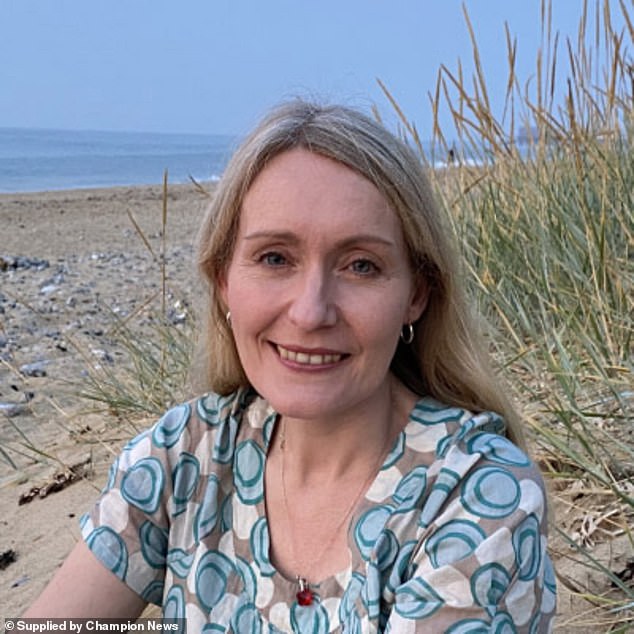A speech therapist whose tongue was left ‘on fire’ after wisdom tooth surgery is suing her dentist for £1million.
The 55-year-old claimed the operation ruined her career and the pain is driving her crazy.
Alison Winterbotham was injured during the removal of her lower right wisdom tooth by dentist Arash Shahrak in November 2020 after painful gum inflammation.
She claims that during surgery under local anesthesia, her lingual nerve, which provides sensation to the tongue, was essentially severed, which she says left her with almost constant searing pain.
Mrs Winterbotham has now sued the dentist, claiming the operation ruined her career in speech therapy and counseling because it now hurts to speak.

Alison Winterbotham was injured during the removal of her lower right wisdom tooth



speech therapist Alison Winterbotham outside the High Court in London
Seeking damages of £956,528 in the High Court, she accuses him of negligently failing to advise her of the potential risk of serious nerve damage before removing her tooth.
But Dr Shahrak denies any responsibility, insisting he gave his patient full advice about the risks of the surgery before going ahead and had no reason to rate her as ‘high risk’.
The court heard how the nerve injury has destroyed Mrs Winterbotham’s personal life and career, driving her “crazy” and leaving her struggling with chronic pain and feeling mentally drained.
“No one will take this pain away, I’m stuck with this until the day I die,” she told the judge from the witness box.
“It’s like my tongue is on fire, that’s all I can say.”
Mrs Winterbotham, from Cambridge, likened her pain to a constant burn, explaining: ‘My tongue burns and tingles all the time and it hurts.
“Every time I move my tongue to talk a little, the nerve gets overstimulated, making the burning and tingling worse.
“It’s worse when I’m talking,” Ms Winterbotham said, adding that she is “desperate” to continue her career but has been unable to return to speech therapy and can only see two or three counseling clients a day as needed. breaks from speaking.



Dentist Dr Arash Shahrak operated on her in November 2020 after suffering from painful gum inflammation
“Even seeing that many patients can feel like a struggle…if I’m trying to see four clients a day, I feel overwhelmed.”
Explaining the impact on her client, Camilla Church’s barrister told Judge Neil Moody KC: “Experts agree that the chronic pain experienced by the claimant has significantly and adversely affected the quality of her sleep and significantly affects her ability to eat and to drink
“The experts agree that the applicant’s ability to speak has been adversely affected by the chronic neuropathic pain she experiences and that, as the applicant is a speech therapist, her ability to speak affects her ability to work.
“Experts agree that the index finger injury and associated neuropathic pain will affect her ability to work as a consultant.
“The applicant’s chronic pain has had a significant impact on her social and family life and that the applicant has withdrawn socially as a consequence of her chronic pain.”
The barrister went on to claim that Dr Shahrak – based at a surgery in Sawston, near Cambridge – was at fault for failing to secure his patient’s “informed consent” before removing her wisdom tooth.
“Ms Winterbotham alleges Dr Shahrak did not obtain her consent to perform the operation,” Ms Church said.
He said Mrs Winterbotham was not “informed enough or at all” about the risk of nerve injury and was not offered a bone scan to assess the level of that risk.
“She was not advised of the alternative treatment of coronal resection, which would have reduced the risk of injury to both the inferior alveolar nerve and the lingual nerve,” he added.
A coronalectomy procedure would be a safer option, as it involves removing only the crown of the affected wisdom tooth while keeping the roots intact, he said.
But Dr Shahrak denies any wrongdoing and insisted he did everything he could to ensure his patient was aware of all the potential risks, including the risk of injury she suffered.
In his witness statement, he said he offered all the key information needed for Ms Winterbotham to make an informed decision.
“I saw Mrs Winterbotham on 17 November 2020,” he said.
“Prior to her appointment she was provided with a document labeled ‘Guidance note – Wisdom teeth removal’.
Alternative coronary artery bypass grafting would never have been carried out as there was nothing to suggest scans should have been carried out that would have indicated it, his lawyers say.
They also dispute the amount Ms Winterbotham is claiming, suggesting her claim of almost £1m is too high and that she could do more work than she does.
Neurologist Robena Dhadda, giving evidence, told the judge she believed part of the reason Ms Winterbotham had not fully returned to work was a lack of confidence.
With psychological counselling, she could return to speech therapy, he said, adding: “I think she could realistically aim to regain 70 to 80 per cent of her pre-incident working ability.
“He has not tried to return to speech therapy. I think it has to do with self-confidence and low self-esteem because he hasn’t tried to go back to speech therapy.”
With shorter breaks, he could also see more counseling clients, he said.
“I think she could make it work for her,” he told the judge.
For Ms Winterbotham’s case against the dentist to succeed, she must first prove a “breach of duty” to the dentist in not pointing out all the risks and not pointing out possible alternative treatments, the court ruled.
The court was told that if he clears that hurdle, he will then have to prove “on the balance of probabilities” that the nerve damage would have been avoided if he had undergone the alternative treatment of coronary artery bypass grafting.
The trial continues.


